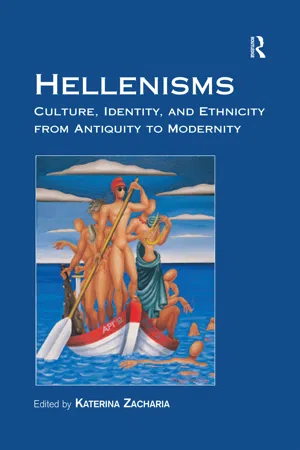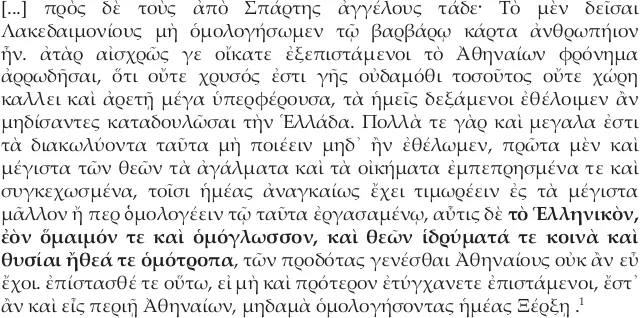1. The Sources: Some Qualifiers
All contributors were invited to think about the four characteristic features of Hellenism (blood, language, religion, and customs) listed by some anonymous Athenian speakers at the end of Herodotus VIII, in the caption of this chapter. Some of the questions the contributors were asked to explore are: How far has it been true historically that these four features have acted as the wheels on which the vehicle of Hellenism has traveled, and where inside the vehicle has the weight of the “passenger” been distributed?
I take “custom” as an invitation to address briefly a much-debated problem between anthropologists: whether there is such a thing as a generally “Mediterranean” or specifically “Greek” (peasant) culture at all. The ethnography of the Mediterranean cultural domain dates from Herodotus and has attracted the attention of some of the founding fathers of social anthropology, such as Fusel de Coulanges, Frazer, Durkheim, etc. The fieldwork of anthropologists like John K. Campbell, Juliet du Boulay, and Charles Stewart is premised on the assumption that there is indeed a “Mediterranean” or “Greek” cultural entity waiting to be investigated as a discrete and coherent subject of study. Of course, the study of such a culture would be subject to the usual difficulties faced by anthropologists interested in simple, that is, pre- or semi-industrial communities, namely the erosion and disappearance of distinctive cultures as a result of the ubiquity of global American consumerism, television, and so on.
The premise that there is such a “Mediterranean” or “Greek” culture at all was recently challenged by the anthropologist Michael Herzfeld, who attempted to show that some specific traits that supposedly made the “Mediterranean” or “Greek” culture distinct from other cultures, such as obsession with male honor and female chastity, were to be found also in Japan or other non-Mediterranean societies.2 The peculiarity of the “Mediterranean” culture is now defended by Horden and Purcell in a massive first installment of a comprehensive study of the Mediterranean.3 But even they have to admit that much of the so-called “modern” evidence itself consists of historical documents in the sense that the societies described no longer exist.
The classic work of modern Greek anthropology is John Campbell’s Honor, Family and Patronage (1964), a brilliant account of the Sarakatsani of northwest Greece.4 The fieldwork was done in the 1950s, but recent investigators have concluded that the Sarakatsani have totally ceased to exist as a distinct cultural group, as totally as the Greeks of Homer or Thucydides. This is, of course, a problem facing Africanists or students of Balinese cockfights, so it is not peculiar to Mediterraneanists. Modern anthropological monographs tend to be theory plus fieldwork; applications of anthropology to the ancient Greeks tend to be theory plus literary and especially epigraphic evidence. An example is Robert Parker’s Míasma, which applies the pollution theories of the late Mary Douglas to the ancient Greeks.5
The comparative evidence of modern Mediterranean societies is what we may call the indirect sources the ancient historian has recourse to when studying ancient Greece. The direct sources are literary, epigraphic (inscriptions, usually on stone), and material remains. Material evidence is notoriously difficult to deploy in arguments about ethnicity, because, for instance, changes in pottery styles or methods of disposing of the dead can be explained in ways other than by the creation or arrival of a new ethnic group. I will briefly note here some considerations when dealing with literary and inscriptional evidence.
The Greeks memorized huge quantities of poetry and wrote down both it and an extensive and probably non-memorized prose literature, and they recorded their decisions and their ritual ordinances on inscriptions. To take these points in order: The Greeks were unlike the Sarakatsani in that they left a large and sophisticated literature behind them, a significant fraction of which continued to be copied in later centuries because, for educational and cultural reasons, it continued to be valued.
The literary sources are plentiful but it is essential to remember two things about ancient literature. First, by no means all of it survives. This ought to be one of the easiest things for Classicists to remember but is, in fact, one of the hardest. For example, endless books about the fifth-century BC Athenian tragedian Sophocles are published—several a year, at least. However, there are just seven surviving plays of Sophocles and it is an unkind but accurate generalization to say that most modern monographs about him consist of eight chapters: one for each play and one called “Conclusion.” And yet, we know Sophocles wrote over 120 plays, and the fragments of these plays, that is, quotations or literal fragments on papyrus, fill a volume this size. Moreover, some of the lost plays are wildly different in character from the surviving ones; for instance, one of the most savage of his plots deals with the myth of Tereus, Procne, and Philomela (see below). From the fragments, it is clear that one legitimate reading of the play, which has the Thracian King Tereus raping the Athenian princess Philomela and cutting out her tongue, is as an exploration of the close bloody and uneasy relationship between the Athenians and their non-Greek northern neighbors, the Thracians. This is very relevant to the way Athenians constructed their own identity and the way they viewed their northern neighbors, such as Macedonians and Thracians. And there are important authors whose entire output is fragmentary. For students of ancient ethnicity, two of the worst losses are the writers Eratosthenes and Posidonius, both of whom wrote in the Hellenistic Period, the three centuries after the death of Alexander in 323 BC. If we had Eratosthenes in the original instead of having to reconstruct him from Strabo’s criticisms (time of Augustus, 30 BC–AD 14), we would know far more than we do about ancient geography, and this would have implications for the study of ancient Greek ethnicity. Again, Posidonius’ work on the Celtic contemporaries of the Greeks and Romans has to be reconstructed indirectly; it had influenced surviving ethnographic treatises like those of Caesar and Tacitus.
My second general warning regarding literary evidence concerns the bias of what survives. Even the most objective-seeming of them, Caesar being an obvious example, are steeped in rhetoric, that is, the art of persuasion. Greek historians as well as poets filled their writings with speeches, usually invented and tendentious productions. Certain genres, tragedy and comedy being two, consist of nothing but speeches punctuated by choral song. Therefore, studies of Greek conceptions of barbarians, a topic to which I shall come in a moment, can use the evidence of tragedy only if it is remembered that there is no such thing as an authorial utterance anywhere in any play. Everything is spoken or sung by a fictitious character or by the chorus. For the modern student of ethnicity, the most seductive Greek writer is the fifth-century BC historian Herodotus, because he makes first-person-singular authorial comments on alien cultures in a way which superficially anticipates modern anthropology. But in the formulation of James Redfield, Herodotus, an anthropologically minded Classicist whose father was himself a distinguished anthropologist, was a tourist rather than an anthropologist; he makes no real attempt to get inside the cultures he describes.6 That is not the only problem. An influential modern book on Herodotus, called The Mirror of Herodotus, by the French structuralist François Hartog, suggests that Herodotus’ material on the Scythians north of the Black Sea is really a clever and indirect commentary on Athenian national characteristics to which Herodotus holds up the mirror of the title.7 Anthropologists are familiar with this approach: Ruth Benedict’s The Chrysanthemum and the Sword purports to be about the strange customs and attitudes of Japan but turns out to be about twentieth-century America, after all.8
The Greeks not only wrote a lot, but they also inscribed a lot; they had what had been called the epigraphic habit. Sometimes it is just the physical medium which distinguishes epigraphic from literary texts. For instance, the Danish excavations at Lindos on Rhodes a century ago discovered a long historical narrative called the Lindian Chronicle. It was inscribed on the temple wall but it might just as well have been preserved on manuscript or papyrus. There is a subtler and, for our purposes, more important sense in which inscriptions resemb...

